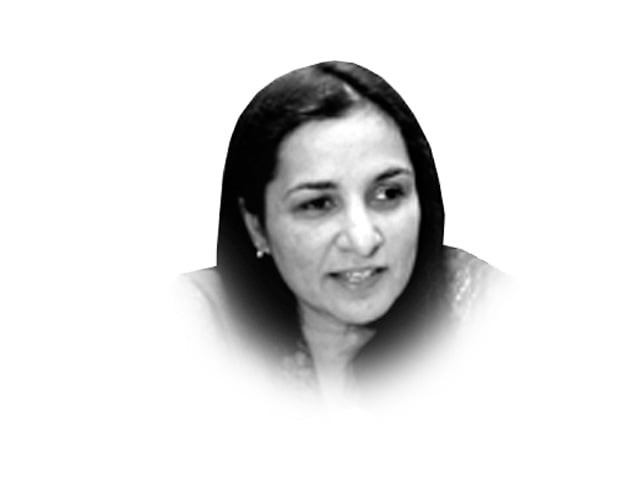Beyond the opprobrium, realism rules
The old narrative is unsustainable; a new one, along nationalist lines, will unite the anxious and probing Pakistanis.

The writer is a senior anchor at Capital TV and a fellow at Harvard University Asia Centre. She tweets @NasimZehra
It all began when within days of Prime Minister Nawaz Sharif’s summit meeting with US President Barack Obama, when a US drone killed the TTP leader, the self-acknowledged terrorist Hakimullah Mehsud. Our interior minister, an agitated Chaudhry Nisar, complained that Washington had killed peace. That, in fact, Washington had also gone back on its promise that it would not target the TTP leader. The minister said he had personally told the US ambassador in Islamabad that Pakistan was working on opening dialogue with the TTP and requested that Mehsud not be targeted. The Punjab Chief Minister Shahbaz Sharif also echoed Nisar’s complaint. He said that he, too, had told the Americans of Islamabad’s effort to begin dialogue with the TTP and hence, its leader should not be attacked.
The outcry against the drone attack expanded into an attack on relations with the US. In a subsequent National Assembly session, the interior minister announced that in view of Washington’s act of ‘killing’ Pakistan’s peace efforts, the government will ‘review every aspect of its relationship’ with Washington. His grouse was against what he said was the Obama Administration’s double standards. It had sabotaged Pakistan’s dialogue effort with the Taliban while having itself started a dialogue with the Afghan Taliban.
Matching the government’s anger against the Americans was the anger of Imran Khan, the leader of Pakistan’s second largest party. He had announced stopping Nato supplies by staging street protests in K-P, the province through which Nato supplies pass. Well, weeks have passed and for various reasons, the outraged Khan has had to postpone the protests, at least, thrice.
The interior minister, who is considered to be the right-hand man of the prime minister, had announced the urgent convening of the Cabinet Committee on National Security, the highest policymaking forum. Nisar had threatened to ‘review the entire gambit of relations’ with the US. Of course, there wasn’t much room to manoeuvre in the relationship. After all, what was Nisar contemplating? He couldn’t have been thinking of a replay of the 2011 lockdown? That was after the October 2011 US military attack on Pakistan’s military post in Salala. That reason was different; it was a clear violation of Pakistan’s territory and sovereignty leading to the death of Pakistani soldiers. It was a studied and united national response with relatively better economic conditions at home.
Now, as testimony to its fairly weak economic condition, the Pakistani rupee has lost its value against the US dollar by almost 10 per cent, in three months. And it’s steadily moving on a downward trajectory with no sign of any quick recovery. When the interior minister threw the gauntlet at Washington, the country’s finance minister was negotiating an IMF package to prop up the economy. Also, he was reminding the Americans of their long overdue reimbursement of the Coalition Support Funds.
Upon his return from his US-UK trip, the prime minister convened a meeting on security, as was his key minister’s wish. That was less to genuinely review all parameters of the relationship and more for solidarity with his distraught interior minister. Both for the government at the centre and for the PTI-led K-P, it’s business-as-usual with the US.
Meanwhile, in the last fortnight, Pakistan’s ministers for energy and planning arrived in Washington to seek cooperation and support for the country’s lifeline sectors, water and electricity. Without Washington’s support, Islamabad will find it difficult to construct the Diamer Bhasha and Dasu dams. Washington, too, sent off its navy secretary to discuss naval cooperation. In K-P, the PTI-led government receives major US funding to implement its development projects. On Pakistan-US relations, again, realism rules rather than hyperbole.
Meanwhile, within Pakistan, there has been another significant fallout of Hakimullah’s killing. The popular and shrill debates in the media have forced an internal rethink. Pakistan’s post-‘80s national security paradigm that popularised religious motivation, US antagonism and the ‘evil’ enemy, is unraveling. The old narrative is unsustainable; a new one, along nationalist lines, will now unite the anxious and probing Pakistanis.
Published in The Express Tribune, November 22nd, 2013.
Like Opinion & Editorial on Facebook, follow @ETOpEd on Twitter to receive all updates on all our daily pieces.













COMMENTS
Comments are moderated and generally will be posted if they are on-topic and not abusive.
For more information, please see our Comments FAQ